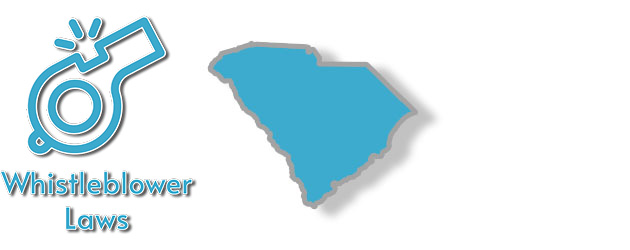
A Summary of South Carolina Whistleblower Laws
South Carolina is an employment-at-will state. This means employees can be discharged from work for any reason or no reason. However, there are a few exceptions to this doctrine that are used to protect employees from wrongful retaliation. These exceptions include common law protections and statutory protections. Statutory protections are laws that are enacted by the state’s legislature to address specific subject areas, e.g., workers’ compensation, whereas common law protections are laws that are created by courts to address subject areas that are not covered by enacted laws.
This is a summary of South Carolina Whistleblower Laws, make sure to check out the Federal Whistleblower Laws as well.
Whistleblower Rights in South Carolina
Common Law Protections for Whistleblowers in South Carolina
South Carolina has a public policy that is applied as an exception to the employment-at-will doctrine. Therefore, it is illegal for employers to discharge an employee for reasons that violate public policy. To determine whether an employee is eligible for protection under the state’s public policy, the courts usually rely on statutory protections, constitutional provisions, and prior judicial opinions. Generally, South Carolina protects employees who engage in the following activities from wrongful discharge:
- Refusing to violate a state or federal law.
- Refusing to participate in illegal activities.
Statutory Protections for Whistleblowers in South Carolina
Public Employees
No public body is allowed to suspend, demote, or alter terms of employment of a public employee in retaliation for reporting wrongdoing to the appropriate authority. S.C. Code Ann. § 8-27-20.
Discrimination
Employers are not allowed to in any way discriminate against an employee or applicant for employment in retaliation for:
- Opposing practices made unlawful under this statute.
- Making a charge under this statute.
- Testifying or participating in an investigation, hearing, or proceeding under this statute.
Under this statute, it is unlawful for employers to discriminate against any individual on the basis of race, religion, color, sex, age, national origin, or disability. S.C. Code Ann. § 1-13-80(F).
Occupational Health and Safety
No person is allowed to discharge or in any way discriminate against an employee in retaliation for:
- Filing a complaint under this statute.
- Instituting or causing the institution of a proceeding under this statute.
- Testifying or intending to testify in a proceeding under this statute.
- Exercising a right under this statute on behalf of himself, herself, or others.
Workers’ Compensation
Employers are not allowed to discharge or demote an employee in retaliation for:
- Instituting or causing the institution of a proceeding under this statute.
- Testifying or intending to testify in a proceeding under this statute.
Landlords
Landlords are not allowed to increase rent to an amount that is above the fair market value, decrease essential services, or bring an action for possession against a tenant in retaliation for:
- Filing a complaint concerning a violation of health and safety rules applicable to the landlord’s premises with a governmental agency charged with responsibility for enforcement of a building or housing code.
- Filing a complaint concerning a violation of this statute with the landlord.
Whistleblower Retaliation Claims in South Carolina
Unless stated otherwise by a statute, retaliation lawsuits should be filed within 3 years of the retaliatory action.
Workers’ Compensation
Lawsuits under this statute should be filed within 1 year of the retaliatory action.
Discrimination
Complaints under this statute should be filed with the South Carolina Human Affairs Commission (SCHAC) within 180 days of the retaliatory action.
Public Employees
Any action under this statute must be commenced within 1 year of the retaliatory action or after the exhaustion of administrative and judicial remedies.
Occupational Health and Safety
Complaints under this statute should be filed with the Director of the Department of Labor, Licensing, and Regulation within 30 days of the retaliatory action.
Whistleblower Hotlines in South Carolina
To file a complaint with the South Carolina Human Affairs Commission, call 803-737-7800.
To file a complaint with the South Carolina Department of Labor, click here.
Whistleblower Retaliation and Violation Penalties in South Carolina
Workers’ Compensation
Employers who violate this statute may be liable to the aggrieved employee for lost wages suffered as a result of the violation and reinstatement.
Discrimination
Employers who violate this statute may be liable to the aggrieved individual for:
- Reinstatement or hiring of the complainant with or without back pay.
- Plus any other equitable relief deemed appropriate by the court.
Payment of back shall be limited to only 2 years starting from the date the complaint was filed. Unemployment compensation, interim earnings, or amount earnable with reasonable diligence, by the person or persons, discriminated against shall operate to reduce the back pay otherwise allowable.
Public Employees
Employers who violate this statute may be liable to the aggrieved individual for:
- Reinstatement.
- Lost wages.
- Actual damages not exceeding $15,000.
- Reasonable attorney’s fees not exceeding $10,000 for any trial and not exceeding $500 for any appeal.
Occupational Health and Safety
Employers who violate this statute may be liable to the aggrieved individual for:
- Rehiring or reinstatement of the aggrieved employee with back bay.
- Plus any other relief deemed appropriate by the court.
Landlords
Landlords who carry out unlawful retaliation against a tenant may be liable to the aggrieved tenant for:
- Recovering of possession or termination of the rental agreement.
- 3 months periodic rent or 2 times the actual damages, whichever is greater.
- Reasonable attorney’s fees.
More South Carolina Laws
- Murder Sentencing Guidelines – Minimum to Maximum for Every State (2026)
- South Carolina Car Seat Laws
- South Carolina Child Support Laws
- South Carolina Hit and Run Laws (2026 Guide)
- South Carolina Lemon Law: Complete Guide for 2026
- South Carolina Recording Laws
- South Carolina Sexting Laws (2026 Guide)
- South Carolina Statute of Limitations
- South Carolina Whistleblower Laws